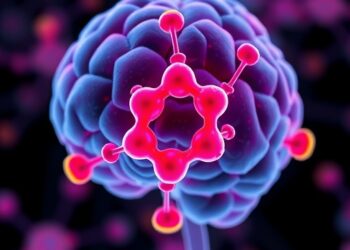A new study from the University of Michigan Health Rogel Cancer Center finds that giving a fatty acid inhibitor alongside chemotherapy could improve the treatment efficacy for patients with brain metastases from triple negative breast cancer. The findings appear in npj Breast Cancer.
A new study from the University of Michigan Health Rogel Cancer Center finds that giving a fatty acid inhibitor alongside chemotherapy could improve the treatment efficacy for patients with brain metastases from triple negative breast cancer. The findings appear in npj Breast Cancer.
Previous work has shown that the brain microenvironment has very limited lipids available for cancer cells, making it critical for cancer cells to generate their own lipids to survive. “We aimed to exploit this metabolic vulnerability by inhibiting fatty acid synthase, an enzyme that produces fatty acids, in triple negative breast cancer models that have metastasized to the brain,” said Nathan Merrill, Ph.D., assistant professor of hematology/oncology at Michigan Medicine and corresponding author on this paper.
In addition to improving the efficacy of chemotherapy, the findings also show that inhibiting fatty acid synthase alone at low doses decreases cells’ ability to move and spread throughout the body.
Triple-negative breast cancer, along with HER2-positive breast cancer, carry the greatest risk of spreading to the brain.
To test the fatty acid synthase inhibitors in combination with chemotherapy, Merrill and his team looked for “synergy,” a rigorous way to evaluate if two drugs work better together than separately.
“What really sets our work apart is that we, for the first time, present two new cell lines that were developed from a patient with brain metastases,” said Merrill. “These cell lines are especially unique because they came from the same patient and represent multiple resections of tumor. This is a valuable resource to add to the field.”
These findings take Merrill’s team in exciting directions. Next, they want to understand how exactly metastases are impacted by inhibition of fatty acid synthase.
“Our lab has previously developed a chip that mimics the brain microenvironment. We want to use this device to better understand what steps in the metastatic cascade are most impacted by fatty acid synthase inhibition,” Merrill said.
Additionally, they want to test these findings in mouse models. Fatty acid synthase inhibition has been found to be safe in phase 1 clinical trials, and is even used in non-cancer treatment of nonalcoholic fatty liver disease, now called metabolic dysfunction-associated steatotic liver disease. Additionally, fatty acid synthase inhibition is currently being evaluated as an add-on therapy in HER2-positive advanced breast cancers.
More research is needed, but Merrill says he’s hopeful that, pending validation in mice, these results could be translated to improve treatment in patients with triple-negative breast cancer.
Additional authors: Habib A. Serhan, Liwei Bao, Xu Cheng, Zhaoping Qin, Chia-Jen Liu, Jason A. Heth, Aaron M. Udager, Matthew B. Soellner, Sofia D. Merajver, Aki Morikawa
Funding: Funding for this work was provided by the Susan G. Komen Breast Cancer Foundation (Career Catalyst Research Grant, Merrill) the Breast Cancer Research Foundation (Merajver), and NIH R33 CA261696 (Merajver).
COI: The authors declare no competing interests.
DOI: “Targeting fatty acid synthase in preclinical models of TNBC brain metastases synergizes with SN-38 and impairs invasion,” npj Breast Cancer. DOI: # 10.1038/s41523-024-00656-0
Journal
npj Breast Cancer
Method of Research
Experimental study
Subject of Research
Cells
Article Title
Targeting fatty acid synthase in preclinical models of TNBC brain metastases synergizes with SN-38 and impairs invasion
Article Publication Date
10-Jun-2024




